The author, Fr. Nectarios Trevino, is a priest of the Russian Orthodox Church Outside of Russia (ROCOR) who serves in the Cathedral of St. John the Baptist in Washington, DC. Fr. Nectarios recently moved from the Carpatho-Russian archdiocese, which was under the omophorion of the Constantinople Patriarchate, because he could no longer conscionably serve under a patriarchate that is blatantly violating Church canons and causing confusion and misery in Ukraine.
The Profane and the Sacred
The existential crisis in the Holy Orthodox Church is, sadly, being fought in every arena, from international political diplomacy, to struggles between great powers displaying their military might, to include the various media venues stirring the emotions of Orthodox Christians worldwide. Even historical-ecclesiastical scholarship is subjected to enormous pressures to produce targeted conclusions. The present crisis in the news did not begin today. Its roots began in the nineteenth century—if not earlier, continued into the twentieth century, and are maturing in the twenty-first century with a new fervor into an unprecedented form of authority and authenticity—perhaps trusting that God and His people are not looking. Its effects will be multi-generational, forever changing the landscape of the Holy Orthodox Church and world history. What follows is a brief overview.
A Brief History
“The Church of Greece, with a membership of approximately nine million people, was officially recognized as a self-governing church in 1850.”1 Its recognition as a self-governing [autocephalous] church was attained by a special tomos issued by the Ecumenical Patriarch2 at the “1850 the Endemousa Synod.”3 The Endemousa Synod, “synod of inhabitants” (synodos endemousa), was a local governing creation of the Ecumenical Patriarchate, not an Ecumenical Council. “The endemousa synod grew steadily in importance and eventually became a permanent institution in the Orthodox Church. Its preoccupation with doctrinal issues, legislative affairs and disciplinary matters far exceeded the traditional but limited role of the provincial synod. Furthermore, it did not require the elaborate preparations of an ecumenical synod.”4
“As long as the Endemusa Synod lasted, it in no way affected the legal position of the Patriarch of Constantinople, nor was it in any sense a government of his patriarchate by synod. In this case too, as at Rome, the consulting synod had no rights. The patriarch governed his subjects as autocrat, had the same responsibilities as other patriarchs. If he chose to discuss matters beforehand with “the most holy bishops who dwell in the mighty city” that proceeding concerned no one else. So the Endemusa Synod continued to meet regularly and became eventually a recognized body. So little did the patriarchs fear a lessening of their authority from it that it was to them rather an additional weapon of aggrandizement. There was a certain splendour about it.
The œcumenical patriarch could contemplate the college of cardinals marshalled around the Western throne with greater complacency when he remembered his hagiotatoi endemountes episkopoi. The Endemusa Synod was abolished only in quite recent times as part of the general reorganization of the patriarch’s ecclesiastical and civil jurisdiction since the hatti-humayun of 1856.”5 [Emphasis added.]
It is important to know the preceding inasmuch as the special tomos for the Church of Greece came from a standing governing synod within the Ecumenical Patriarchate and not from an Ecumenical Council requiring the conciliarity of and reception by the other existing authocephalous churches.
The modern day Serbian Orthodox Church was re-established in 1920 after the First World War when “all Serbs were united under one ecclesiastical authority, the patriarchate was re- established in 1920 and the full patriarchal title became Archbishop of Pec, Metropolitan of Belgrade-Karlovci and Serbian Patriarch.”6 The Serbian Church received its autocephalous status from the Ecumenical Patriarch in 1879 principally as the Metropolitanate of Belgrade.7 In 1920, the Ecumenical Patriarchate recognized the newly united Serbian Church as a patriarchate. Through a 1922 tomos, Constantinople recognized the present boundaries of the Serbian Patriarchate.8
The legacy of the Cold War led to the Ecumenical Patriarch’s establishment of the autonomous Estonian Apostolic Orthodox Church in 1996, which “was at odds with the Estonian Orthodox Church under the Moscow Patriarchate” and the re-issuance of tomos of autocephaly to the Czech and Slovak Church and the establishment of an autonomous Polish Orthodox Church.
Indeed, the conflict for ecclesial territorial between the Ecumenical Patriarch and Moscow has extended to the Korean peninsula, China-Hong Kong, Canada, United States, Western Europe, and Australia.9
The Cold War may be over, but it is now manifested in ecclesial realms potentially contributing to the re-ignition of a new political-military stand-off between military powers. As a consequence, our children and grandchildren may well be fighting in a future war, one in which present day religious leaders may have planted the seeds for its fruition.
The Present Struggle
With the collapse of the Soviet Empire—the Soviet Union and its satellite nation-states—an ecclesiastical vacuum resulted. As is evident above, the vacuum was, in many ways, filled by the extension of the Ecumenical Patriarchate’s reach into previously inaccessible regions. The struggle, then and now, is focused between the Church’s two centers of power, Constantinople and Moscow. The de facto and de jure crisis today is Ukraine.
Ukraine
The proverbial political-military fault line between the West and Moscow is Ukraine. It is into this realm that the Orthodox Christian battle lines have been drawn, in no small part with the active encouragement of the West and Moscow. The direct involvement by the U.S. Secretary of State, possibly in contravention to the intent Religious Freedom Restoration Act of 199310 (which admittedly applies to the federal government, but its intent could justifiably be extended, in principle, internationally), wherein the Secretary, through a press release stated:
We support Ukrainians’ ability to worship as they choose and hope this will be respected by all. Tolerance, restraint, and understanding are key to ensuring that people with different religious affiliations can live and prosper together in peace. We urge Church and government officials to actively promote these values in connection with the move towards the establishment of an autocephalous Ukrainian Orthodox Church.11 [Emphasis added.]
What is the interest of the U.S. Government in the religious affairs of Ukraine if not as part of a great power game with Moscow? In what other region of the world has the U.S. Government articulated a specific religious path for a nation-state? Would the U.S. Government make a similar statement about a Jewish, Muslim, or other nation-state? Actively interfering in the religious freedom if those who practice the Orthodox Christian faith stands in stark contrast with the State Department’s Office of International Religious Freedom, headed by the Ambassador at Large for International Religious Freedom, Samuel D. Brownback, wherein its mission is to “Promote freedom of religion and conscience throughout the world as a fundamental human right and as a source of stability for all countries.”12 Secretary Pompeo has, with his statement, well exceeded the U.S. Government’s policy by not only choosing sides, but a specific manner of worship and Orthodox Christian governance.
Ukraine’s internal political struggles are well documented and readily evident in recent history, playing out on various media forums. The old Soviet power influences and manners of doing business have yet to die. Its struggles to attain standards of Western nation-state civility are evident but slow in coming. Twenty-seven years since its declaration of independence, the trust of the Ukrainian people in its institutions is wavering.13
This time, however, the latest battlefront in Ukraine has moved from the streets and border areas, wherein strife is still evident and people are dying, to the altars of Orthodox Christianity. The transcendental altar of Christ is being sought to define a nation-state.
The Church Battlefront
“Ukrainian calls for church independence have grown since the 2013-2014 Maidan uprising in Kyiv and Moscow’s 2014 annexation of the Crimean Peninsula. Backing those calls has been Ukrainian President Petro Poroshenko, who is seeking re-election next March. On Sunday [October 14, 2018], he said any believer would “choose his own path to God,” but added it was “an issue of Ukrainian independence.””14 [Emphasis added.]
“But added it was “an issue of Ukrainian independence”—so now Ukraine believes that the legitimacy of its independence rests on having its “own path to God” via its own nation-state Orthodox Christian Church.
Will a Ukrainian Orthodox Christian altar transcend the efficacy of any other Orthodox Church’s altar? Will the body of Christ on a Ukrainian Orthodox altar be holier and more worthy to the Ukrainian people? Or is the present issue about the emotions of the people, a rallying of the populace in an existing war, and as President Poroshenko stated “an issue of Ukrainian independence”—a secular, not religious, issue? Is this about the altar of the nation-state?
The Cretan Great and Holy Council, 18-26 June 2016
There were numerous committee meetings over a period of time to decide the agenda for the council. Two of the topics were the granting of autonomy and autocephaly within the Holy Orthodox Church.
“The institution of autonomy is a canonical expression of the relative or partial independence of a particular ecclesial region from the canonical jurisdiction of the autocephalous Church to which it canonically belongs.”15 Prior to the council, consensus, on the topic of autonomy, was attained at the committee-level and, therefore, not an issue for the great body of hierarchs present. Implicitly, since consensus was received, Ukraine’s present autonomous status was acknowledged.
Regarding the issue of autocephaly, the status of a hierarchical Christian Church whose head bishop does not report to any higher-ranking bishop,16 the pre-council agenda committee could not attain a consensus. The irreconcilable issue was: Who would sign the tomos? Historically, one of the ways of granting autocephaly is by the mother-church, such as in the case of the Patriarchate of Antioch’s granting of autocephaly to the ancient Church of Georgia. Contrary to tradition, the Ecumenical Patriarch’s delegates insisted that the Ecumenical Patriarch must be the signatory of any tomos granting autocephaly. Moscow attempted to compromise and recommended that after the mother-church sent the proposal for autocephaly to the Ecumenical Patriarchate to attain the unanimous approval of the existing fourteen autocephalous churches, both the Ecumenical Patriarch and the mother-church would then sign the tomos granting autocephaly. The latter Moscow proposal received majority approval of the autocephalous churches. However, the Ecumenical Patriarch was unyielding and the topic was removed from the Great and Holy Council’s agenda. The die was cast for today’s confrontation thirty months ago.
It merits noting that the granting of autocephaly, given its non-inclusion as an agenda item, remains unchanged.
How to Change the Rules Without Addressing the Rules
The National Bank of Greece funded a study for the Ecumenical Patriarchate that stated “the right of ordination was given to Moscow “for financial reasons,” “from necessity” and “was temporary.””17 The targeted study18 recommended that the Ecumenical Patriarchate could thus revoke the Synodal Letter of the year 1686, again assume dominion over Ukraine, and, presumably, not address the canons of Orthodox Christianity.
A Warning
Perhaps the loudest warning shot across the bow of Orthodox Christianity, directed toward the Ecumenical Patriarch, came from the Serbian Orthodox Church on August 13, 2018.19 Granted the letter is lengthy, but for those who have not read it, it merits partial restatement and your time.
Therefore, the Church generally and the first throne, the Great Church of Christ, specifically finds herself, after the end of the “Constantinian age” in the history of the Church, in an altogether new position, in a fundamentally changed world and with a new, singular responsibility. To speak in an open manner and sincerely, it is not appropriate that she permit for herself the practice of those things that she did not even practice during the height of her fame and might, namely, during the “golden age” of Romiosini. However, it is likewise not appropriate for the other sister Churches to permit for themselves an ungrateful or, God forbid, unseemly and unprincipled attitude against the Church of the first throne, but also even a Mother Church for the newer among them. The present “golden rule” particularly applies to the subject of the conferment of autocephaly to any Church. The unhealthy ethnophylitism and the secular state-centric mindset of our days lays the foundations for their claims on the relationship of the Orthodox Church to baptized peoples and to the, so far as it is historically possible, Christianized societies; nevertheless, they achieve one thing only threatening the catholic and ecumenical character of the Church of God, in this way perhaps also her primal mission to all nations.
The states, nations and “nations,” in which autocephaly is sought, but in practice state- sponsored “political schisms” take effect, which also openly excuse their pernicious activity for the invocation of the state and national agenda, are creations of the Communists, which today for the most part have atheists as leaders, such as the unbaptized and atheist head of Montenegro or the “all-comprehensive believer” such as the president of Ukraine, who is seen in the canonical Church, among the schismatics, and among the Uniates. They do not seek an autocephalous Church because, allegedly, they are its faithful members, but they use it as suitable, but rather unsuitably, for the purpose of strengthening their worldly and essentially atheistic ideology, power and vulgar interests. In the last analysis, it is a question of an abuse of the Church and of the Faith.
Can it be that the condescension of the Church is permitted for such an abuse? For she who is intended to transfigure and save the fallen world, is it permitted for her to conform to and please it? We address these questions especially to the Ecumenical Patriarchate, to our Mother Church, which is called, in the capacity of first throne of the Church, so that, cathartically and sacrificially, she might serve for the unity of the Church. Under no circumstances, influences or pressures whatsoever is it permitted for her to proceed to any hasty action capable of affecting harm to pan-orthodox unity, but especially also of protracting the life of schisms, which, otherwise, it is desired that she might remedy and overcome.
This general principle quite especially applies concerning the now tragic schisms, namely, concerning such ones in Ukraine. A one-sided act of exonerating and restoring schismatics to the rank of bishops, but quite especially of the archschismatic, of Filaret Denysenko the “patriarch” of Kiev, and of restoration of liturgical and canonical communion with the schismatic communities, without their repentance and return to unity with the Russian Orthodox Church from which they broke away, against the will of the Patriarchate of Moscow and without coordinating with it, would be, according to our belief, very unsafe or even catastrophic, but even potentially fatal for the unity of holy Orthodoxy. Such an act would signify at the same time an unbrotherly attitude towards the martyred Church in the Russian lands, when this by no means is expected from the martyred Great Church of Christ. The intervention of Your predecessor (who came to a blessed end), the ecumenical patriarch Gregory VII, in the affairs of the Russian Church approximately a century ago, as well as his attitude towards the holy patriarch Tikhon, the confessor of the faith, on the one hand, and towards the schism of the “renovationists” on the other, should not be used as an example for emulation.
Nor may the fact be overlooked that the Holy and Great Council in Crete confirmed in its ecclesiological encyclical the existence of fourteen autocephalous Orthodox Churches in their present canonical boundaries. The question arises: how is the change of this number of autocephalous churches possible, absent a new Council? Next, by the statement in question of the Council in Crete, it is affirmed implicitly that the autonomous Church of Ukraine is found under the jurisdiction of the Patriarchate of Moscow and that it wholly belongs to it organically. In this case it is unfathomable that the Russian Orthodox Church does not have jurisdiction for the canonical establishment of the Church in Ukraine, but that the “Mother Church,” namely, the Church of Constantinople, does have jurisdiction. Being viewed under the prism of history, the Church of Constantinople is equally Mother Church of both Kiev and Moscow, and of Peć (with Belgrade and Karlovci) and Tyrnavos (Sardica, Sredets, Sofia), and others… If then she has the right of intervening in one autocephalous Church, then, as a consequence, she possesses the right of intervention in every single autocephalous Church. In the meantime, the honor and dignity of ecclesiastical motherhood does not provide the Mother Church with the right of setting no value on or, all the more so, of questioning autocephalies and jurisdictions that were historically formed. In the same manner, established jurisdictional status does not give the Churches the right to belittle and disdain the Mother Church or to pretend that they forgot that a Church is the one who spiritually gave birth to them, or to “order” a Mother for themselves (like the schism of the Skopjans).
An eloquent example of these things being the case is precisely our Church, the Serbian Orthodox Church. Our Mother Church is the Church of Constantinople. Previously it came under the jurisdiction of the Archbishop of Ochrid, but today, as a consequence of many historical events and of the Tomos provided in Constantinople in 1922, the Archbishop of Ochrid comes under the jurisdiction of the Serbian Orthodox Church. In the case of these things, the following results: concerning the future status of the Archbishop of Ochrid, it is not possible for the Ecumenical Throne to decide de jure, absent the Church of Serbia, for the simplest reason that the Archbishop of Ochrid is found under the canonical jurisdiction of the Church of Serbia, as it is also recorded in the Tomos of 1922. Since then, all the Orthodox Churches without exception recognize this jurisdiction. The same thing applies also for Ukraine, but to speak more accurately, for Kievan Rus’, a Church that without a doubt and undeniably is subject to the jurisdiction of the Patriarchate of Moscow, and which has the status of an autonomous Church. Your Most Holy Church, All-Holiness, puts forward from time to time the claim that the Metropolis of Kiev belongs in reality to her and that it has belonged to her continually. Nevertheless, we wonder with all brotherly love and honor: how the fact can be explained that Moscow for so long a time, for three centuries and more, exercised and now exercises jurisdiction over Kiev without any protest whatsoever, from the Great Church of Christ being involved? In addition, the available historical sources do not confirm the allegation concerning the lack of the de facto jurisdiction of Moscow for Kiev. Besides, in the sacred canonical tradition and practice of the Church, the criterion of antiquity existed, of “ancient customs” of relations which had been accepted by all, as You, because of being a distinguished canonist, know better than our own mediocrity.
Within this context we are obliged to point out, that, after decades of theological labor, the process for acquiring and declaring new autocephalies was also agreed in a pan-orthodox manner. The relevant definitive official text was published in the pages of the periodical Synodika published by the Chambésy Centre of the Ecumenical Patriarchate. The manner of signing the Tomos for autocephaly was the only point not agreed upon (with the addition, “it is decided/it is decided together” [ἀποφαίνεται/συναποφαίνεται] or without it). The whole process is thus clear: the Church having jurisdiction takes the initiative of granting autocephaly to any of its own eparchies, the initiative is forwarded to the first throne Church, from whom it is communicated to all the local Churches, consultations follow and, in terms of results, either we have general agreement concerning a new autocephalous Church or a new autocephalous Church does not exist. This is the generally acceptable and accepted position of the local Orthodox Churches and not the stance of one of the hierarchs of Your Most Holy Church, that the Ecumenical Throne alone, absent the rest, without equals (sine paribus), grants or removes autocephaly, acting indeed in this way for 1,350 consecutive years (!).
All-Holiness, in no way does the desire and intent to offend or aggrieve You at all come into our mind, not even indeed briefly, however, we are obligated to remind You both of Your promise, which was given in Chambésy Geneva in the presence of the Primates of the Orthodox Churches in the presence, consequently, also of our own mediocrity that you would not intervene into the affairs of the Church of Ukraine.
Finally, some other questions are also raised, and indeed key questions. How is the recognition of archpriesthood possible at all for a priest who was defrocked by Your Most Holy Church, but then “who has been ordained” as a bishop by schismatic bishops who are deprived of grace, likewise in the meantime who were defrocked by their own Churches? Here, as you can recognize, we have in mind Dedeić, “primate” of the rival assembly or “sect,” which deprived of divine grace, calls herself Church of Montenegro and, like her elder “sister” in Skopje, believes and trumpets, that, after the granting of autocephaly to the Ukrainian schismatics, she will also herself receive recognition and autocephaly. Still incomparably worse is the case of Filaret Denysenko, the self-proclaimed patriarch of Kiev, who is not only defrocked, but also excommunicated and, in addition, anathematized. Not one Church, beginning with Your Most Holy Church, has questioned these facts nor is it possible to do this. But in order that the disorder and chaos might be magnified still more, alone in the world, Filaret recognizes Dedeić as “metropolitan of Montenegro,” concelebrates with him, visited him, and recently, on July 28,
during the celebrations organized by Filaret for the 1030th anniversary of the baptism of the Kievan Rus, the legate of Dedeić, “archimandrite” Boris Bojović, likewise a false clergyman, “concelebrated” in Kiev. According to the popular saying, “The sack found its patch” (Serbian), “The pot found its lid” (Greek and Serbian), “Philip found Nathanael” (in the midst of theologians). Taking into consideration all the things mentioned above, the conclusion is unavoidable that Denysenko and Dedeić indispensably wished to be restored as a “package,” both together, which from a nomocanonical point of view would be a grotesque absurdity. For which reason, we have been persuaded, that you personally and the Holy and Sacred Synod around you wish to remain on the ramparts of orthodox ecclesiology and age-old canonical order…
This would be a realization of the wise Greek proverb according to which, “when one evil occurs a myriad follows,” as well as an affirmation of the enduring timelessness of our Savior’s teaching, that it is when the unclean spirit has been expelled “he brings with him seven other spirits, more evil than himself,” together with them he enters again into the man and “dwells there” if he might find his former “house” “empty, swept and put in order” (Matt. 12, 43-45; cf. Luke 11, 24-26). Certainly, none of us wishes the consequences set forth, since “the last state of that man becomes worse than the first” (Matt. 12, 45; cf. Luke 11, 26).
Namely, we renounce the dreadful prospect that after one evil or perhaps one unclean spirit, the evil and the spirit of already existing schisms, other evils and other evil demons follow, namely, a new schism, deeper and harder to cure, or even schisms. For which reason, again and again we persist in asking and entreat earnestly Your holiness and love: before you even cut once, measure three times! [Emphasis added.]
The obvious consequence of the above warning by the Serbian Orthodox Church is that if the Ecumenical Patriarch can act with impunity today, what is to become of the future of Orthodox Christianity? There will be no checks and balances and the present or a future Ecumenical Patriarch may act, as many Orthodox Christians fear, does the Pope of Rome.
The Famous Appeal Canons
There is recourse, an ability to appeal, within Orthodox Christianity. There are three canons, but each must be viewed contextually and literally.
Apostolic canon 34
The bishops of every nation must acknowledge him who is first among them and account him as their head, and do nothing of consequence without his consent; but each may do those things only which concern his own parish, and the country places which belong to it. But neither let him (who is the first) do anything without the consent of all; for so there will be unanimity, and God will be glorified through the Lord in the Holy Spirit [some mss. read: through the Lord Jesus Christ, and the Father through the Lord by the Holy Spirit, even the Father, the Son, and the Holy Spirit].20 [Emphasis added.] The importance of the above canon, which is dated from the fourth century, is that the “first among them” or protos does nothing without the consent of all and all do nothing without the consent of the protos. There can be no equivocation, all acts come to consensus and unanimity.
While there was no Ecumenical Patriarch at the time of Apostolic canon 34, the canon is no less applicable today. The Ecumenical Patriarch can do nothing (e.g., grant autocephaly) without the consent of all the autocephalous churches. The preceding is vital inasmuch as it deals with the reception of decisions based on the collegiality of the episcopacy. When meeting in synods and councils, bishops receive (namely, approve) the decision(s) of other hierarchs. Ignoring Apostolic Canon 34 and promulgating a unilateral decision without any consultation violates the collegiality of the episcopacy, fracturing the Holy Orthodox Church.
The Ecumenical Patriarch while attempting to ignore Apostolic Canon 34 is seeking to leverage Chalcedon canons 9 and 1721 in its favor.
Chalcedon canon 9
If any Clergyman have a matter against another clergyman, he shall not forsake his bishop and run to secular courts; but let him first lay open the matter before his own Bishop, or let the matter be submitted to any person whom each of the parties may, with the Bishop’s consent, select. And if any one shall contravene these decrees, let him be subjected to canonical penalties. And if a clergyman have a complaint against his own or any other bishop, let it be decided by the synod of the province. And if a bishop or clergyman should have a difference with the metropolitan of the province, let him have recourse to the Exarch of the Diocese, or to the throne of the Imperial City of Constantinople, and there let it be tried. [Emphasis added.]
Chalcedon canon 17
Outlying or rural parishes shall in every province remain subject to the bishops who now have jurisdiction over them, particularly if the bishops have peaceably and continuously governed them for the space of thirty years. But if within thirty years there has been, or is, any dispute concerning them, it is lawful for those who hold themselves aggrieved to bring their cause before the synod of the province. And if any one be wronged by his metropolitan, let the matter be decided by the exarch of the diocese or by the throne of Constantinople, as aforesaid. And if any city has been, or shall hereafter be newly erected by imperial authority, let the order of the ecclesiastical parishes follow the political and municipal example. [Emphasis added.]
The Ecumenical Patriarch’s interpretations and attempted leverage of canons 9 and 17 are problematic. First, a literal reading of both canons has nothing to do with patriarchs. The canons deal with exarchs, an institution that did not exist beyond the fifth century. More specifically, the canons deal with a bishop having a problem with his metropolitan and presupposes the metropolitan system, another point making the canons contextual for the times in which they were written. What the Ecumenical Patriarch is attempting to do is that which the Serbian Orthodox Church warns of: If any bishop anywhere has a problem, that bishop may universally appeal to the Ecumenical Patriarch.
The second problem is that when canons 9 and 17 were written, there were only five exarchs in existence: Caesarea, Alexandria, Ephesus, Antioch, and Heraclea. Contextually and literally, the canons apply to no other locale or hierarch.
The third problem with the Ecumenical Patriarch’s invocation of canons 9 and 17 is that he and his patriarchal staff are ignoring solid scholarship and dispensing with the likes of St. Nicodemus of the Holy Mountain in the Rudder (a standard canon law work used throughout the Orthodox Church and endorsed at one time by the Ecumenical Patriarchate), who is opposed to any interpretation granting some sort of universal appeal to Constantinople.
Conclusion
We have seen across history that overemphasis when approaching theological and canonical problems result in heresies and schisms. An overemphasis on Christ’s divinity resulted in a heresy. Similarly, an overemphasis on Christ’s humanity was heretical. Today an overemphasis on the prerogatives and authorities of the Ecumenical Patriarch is equally dangerous—if not heretical.
The substitution of secular values—“an issue of Ukrainian independence”—for the transcendental nature of God plays to the hands of the demons, empowering them with our own frail humanity. The profane cannot dictate the sacred lest the Holy Orthodox Church be secularized.
The anticipated actions of the Ecumenical Patriarch vis-a-vis Ukraine raises questions of motivation be they political, financial, or matters of power. Where does the salvation of man fit within such decision-making?
We, Orthodox Christians, need to be a part of the body of Christ, not part of a sectarian team—a sect based on an overemphasis of hierarchical privileges. Pursuit of the latter is a sin, an affront to God.

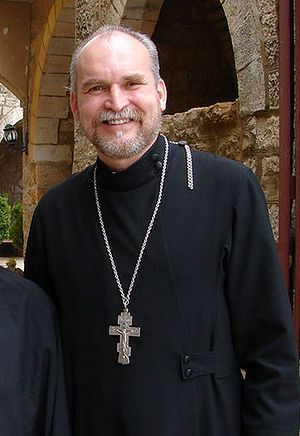
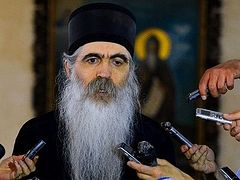
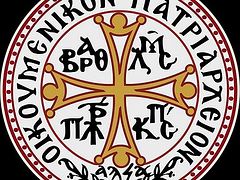
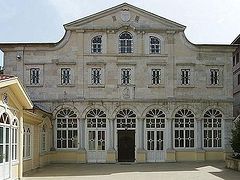
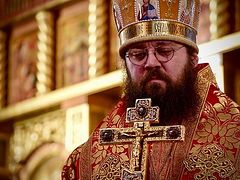
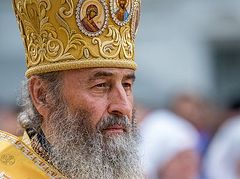
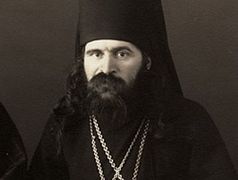
“Do we…need…as some, letters of commendation to you, or…from you? You are our letter written in our hearts, known and read of all men: manifestly declared to be the letter of Christ ministered by us, written not with ink, but with the Spirit of the living God; not in tables of stone, but in fleshy tables of the heart. And such trust have we through Christ towards God: Not that we are sufficient of ourselves to think anything as of ourselves; but our sufficiency is of God; Who also has made us able ministers of the new covenant; not of the letter, but of the spirit: for the letter kills, but the spirit gives life.” (2 Cor. 3:1-12)